Culture
Remembering Satyajit Ray on his death anniversary
Kaushik Saha
Apr 25, 2013, 10:45 PM | Updated Apr 29, 2016, 01:37 PM IST
Save & read from anywhere!
Bookmark stories for easy access on any device or the Swarajya app.
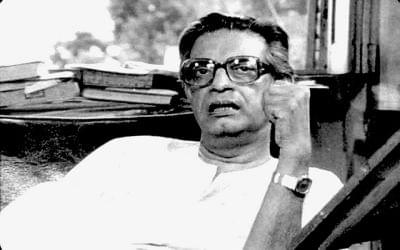
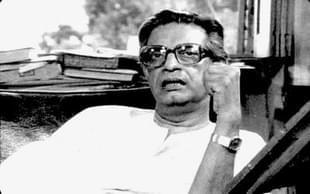
Satyajit Ray passed away on this day 21 years ago. He was a polymath – artist, ad designer, author, film-maker and thinker. However, on World Book Day, I will concentrate on one aspect of his persona – as an author of children’s books
Manik, as Ray was affectionately called, came from a family of authors. His great grandfather Upendra Kishore Roy Choudhury created immortal characters like Gupi Gayen and Bagha Bayen, which were made into a successful trilogy by Manik Babu and his son Sandeep. His father Sukumar Ray is famous as the originator of nonsense verse in India which is compiled in a book known as “Ha Ja Ba Ra La”. His aunt was Leela Majumdar, another famous author of children’s books in Bengali
Ray, the author (remembering him on World Book day)
So it is but natural that Ray would inherit a few of these genes. He did, and created one of the most popular sleuths ever created in a regional language – Felu-da (“da” means elder brother in Bengali). Felu-da, aka Pradosh Chandra Mittir is a Indian version of Sherlock Holmes (Ray repeatedly admitted the influence of Holmes in creating this character – in one particular story, Ray also takes Felu to London where he stands in front of 221B Baker Street and pays homage to Holmes). Felu has an assistant, his cousin Topshe, who is the narrator of Felu’s adventures. Ray also introduced a comic relief in the form of Lal Mohan Ganguly, an author of Bengali thrillers under the pseudonym Jatayu, whose blunders often led to light-hearted consequences
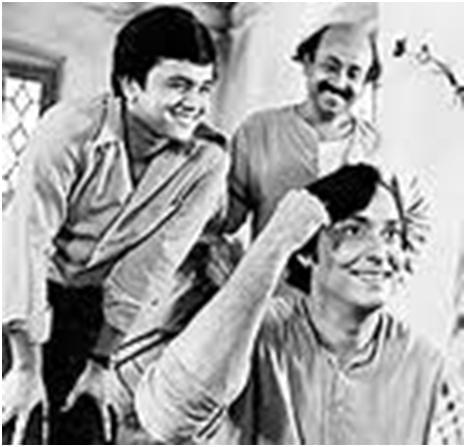
Soumitra as Felu-da, Siddhartha Chatterjee as Topshe and Santosh Datta as Jatayu
Felu-da has been made into movies and tele-serials. On Screen, he has been portrayed by DadaSaheb Phalke winner Soumitra Chattopadhyaya in two movies that Ray directed himself. One of this –”Sonar Kella” (The Golden Fortress) won several Indian and international awards, and is considered to one of the earliest authentic travelogues of the state of Rajasthan. In the second Felu-da movie “Joy Baba Felunath”, Ray shot in Benares, and introduced a Moriarty-esque antagonist Maganlal Meghraj. The movies were commercially successful and helped Ray get finance for his next ventures. Ray never made another Felu-da movie because of the untimely death of actor Santosh Datta who played Jatayu and he didn’t deem any other actor fit to play the character
Ray was the pioneer of science fiction stories in India in more ways than one. A lot of us have heard the urban legend of how he wanted to make a Hollywood film with Marlon Brando based on one of his short stories. Besides that story, he had created a “scientist / inventor” called Professor Trilokeshwar Shonku, who resides in Giridih in Bihar and “invents” several things which proves beneficial to mankind – a medicine which can cure almost all diseases, a pistol which can make anyone vanish, an android robot, even a plane which can run on very low cost fuel. He even does a brain transplant and brings back a dead man to life in another story. What is interesting to note is that many of these were not in existence in the real world at that time – in that respect, Ray was a visionary
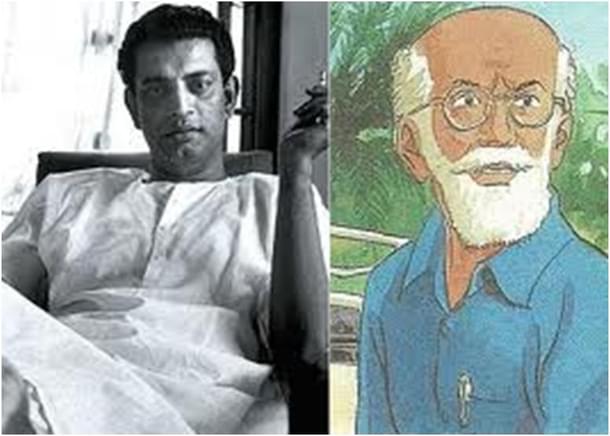
Ray (left) and his creation Professor Shonku (right)
Another of Ray’s creations was Tarini Shankar Banerjee, a Bengali who never stayed put at one job, instead changed jobs at his whims and fancies. After retirement, he settled down in Calcutta, and narrated his experiences to a group of teenagers. Though not a popular as the other two of Ray’ creations, Tarini-khuro (Uncle Tarini) holds his own unique place as his “experiences” are again good travelogues and provide insight into bits of India’s history. Ray’s on experiments with the supernatural came through in the Tarini-Khuro stories
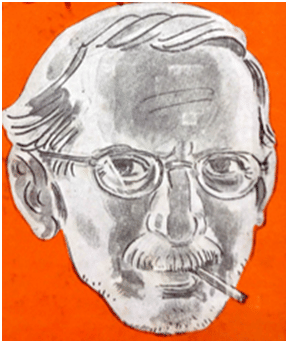
Cover of a book featuring Tarini-khuro
Besides the three characters mentioned above, Ray wrote a number of standalone short stories for children – one of which “Banku-babur bandhu” (Mr. Banku’s friend) was allegedly the story whose idea was copied to make ET: The Extra Terrestrial. Another of his stories “Patol Babu Film Star” is being made into a short film in “Bombay Talkies”, which will celebrate 100 years of Indian cinema. He wrote on topics as diverse as magic, ghosts, unnatural animals, friendships, crime, art and film-making. He himself made 3 movies based on his own works – Phatikchand, Agantuk and Piku-r diary. Ray also translated works by authors like Ray Bradbury and collated an anthology of Mullah Naseerudiin jokes and two autobiographical works – “Jokhon Chhoto Chhilam” (When I was younger) and “Our Films, Their Films”, a short but crisp comparison of Indian and world cinema
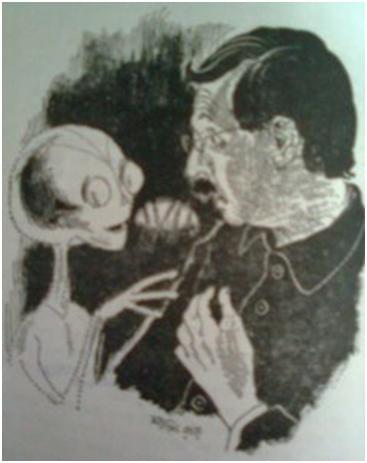
Banku-babur Bandhu – drawn by Ray himself
An analysis of Ray’s works
Ray modeled Felu on himself to an extent, and also as a model of what an ideal Indian youth should be. In many stories, Felu investigates cases for free (despite the fact that money from detection is his major source of income) where innocent lives are threatened; he exercises regularly and is a good athlete, doesn’t lie, and respects the elderly. He has one bad habit though – he is a chain smoker. Most of his stories are travelogues of places like Singapore, London, Kathmandu, Chennai, Darjeeling, Kashmir, Mumbai (then Bombay), and even rural Bihar and Bengal. For Bengalis, who love to travel, yet couldn’t manage to do so regularly due to financial constraints, Felu-da stories were a window to the country and the world
Ray’s staunch nationalism comes across in the form of Professor Shonku. Shonku shunned all luxury, used indigenous methods to develop his inventions, and refused to sell his products to the highest bidder many a time. This landed him in trouble on a few occasions, but he stayed put with his ideals. This has been cited as a response to a query once raised by Nargis Dutt that Ray was promoting Indian poverty through his movies, and thus questioned his nationalism
What I personally believe is that Ray’s works, especially for children, need to be publicized more – because they are a ware house of general knowledge and remarkable in their lucidity





